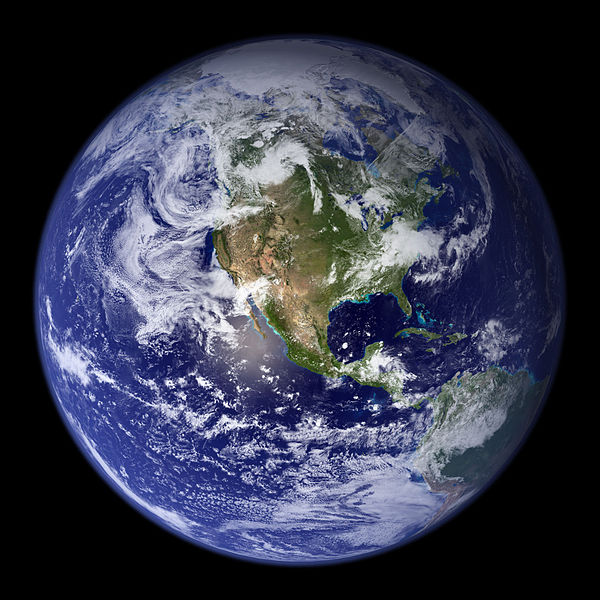The Limits of the Earth — Part 1: Problems
April 18, 2013 by Ramez Naam

(Credit: NASA)
This is part one of a two-part series on the limits of human economic growth on planet Earth. Part one details some of the environmental and natural resource challenges we’re up against. Part two, on the ultimate size of the resource pool and solutions to our problems, will be published tomorrow and linked here. Both parts are based on Ramez Naam’s new book, The Infinite Resource: The Power of Ideas on a Finite Planet
The world is facing incredibly serious natural resource and environmental challenges: Climate change, fresh water depletion, ocean over-fishing, deforestation, air and water pollution, the struggle to feed a planet of billions.
All of these challenges are exacerbated by ever rising demand — over the next 40 years estimates are that demand for fresh water will rise 50%, demand for food will rise 70%, and demand for energy will nearly double — all in the same period that we need to tackle climate change, depletion of rivers and aquifers, and deforestation.
One view of these looming threats is that we’ve exhausted planet’s resources. We’ve overshot the planet’s carrying capacity. Economic growth — the root problem driving our growing consumption and pollution — has to end. Indeed, the global economy may even need to shrink to avoid complete ecological disaster. That’s the thesis of a long line of environmental books, from The Limits to Growth to Peak Everything./.../
The Limits of the Earth — Part 2: Expanding the Limits
April 19, 2013 by Ramez Naam

(Credit: NASA)
This is part two of a two-part series on the limits of human economic growth on planet Earth. Part one details some of the environmental and natural resource challenges we’re up against. Part two, here, looks at the ultimate size of the resource pool and solutions to our problems. Both parts are based on Ramez Naam’s new book, The Infinite Resource: The Power of Ideas on a Finite Planet
The Solution: Growing the Pie
As part one of this series showed, we are up against incredible challenges: feeding a world with a rapidly growing appetite, the continuing loss of the world’s precious forests, the ongoing collapse of fish species in the oceans, the rapid depletion of our fresh water resources, and the over-arching threat of climate change, which makes all others far worse.
Ending growth isn’t a realistic option. Billions of people in the developing world want access to more resources,deserve those resources as much as those of us in the rich world do, and need them in order to rise out of poverty. Growth won’t end without a struggle. And that struggle could turn violent, as it has in the past.
There’s only one acceptable way out of our current predicament. And that is to grow the total pie of resources available to the world’s inhabitants. And a close look at the numbers and at the human history of innovation suggests this is possible./.../
No comments:
Post a Comment